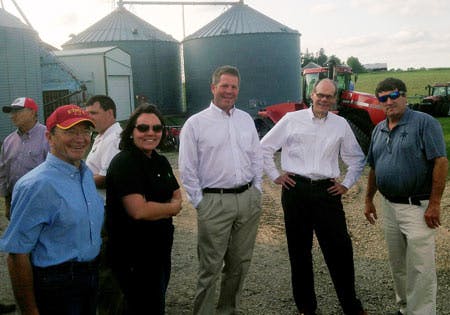International Trade Team Views Iowa Pork Industry

(l. to r.) Wayne Humphrey, Iowa Corn Promotion Board; Carrie Dodds, Iowa Corn Promotion Board; USMEF Chairman Mark Jagels; Thad Lively, USMEF; and Sam Carney, National Pork Producers Council and USMEF Executive Committee member
An international team of pork buyers from Mexico and Honduras enjoyed a top-to-bottom tour of the U.S. pork industry on a visit to Iowa last week in conjunction with the World Pork Expo.
The team of nine buyers representing importers, processors, retailers and food service outlets, was escorted by Dr. Nelson Huerta, director of technical services for USMEF-Latin America.
As part of a four-day overview of the U.S. pork industry, the team toured three pork processing plants, received a technical overview on the U.S. pork industry at Iowa State University, was given a briefing from the Iowa Soybean Association, visited retailers and food service outlets, and toured a corn and soybean farm in Prairie City, Iowa.
Funding for the visit was provided through the Iowa Soybean Association.
“This visit helped these pork buyers get a much better understanding of how the U.S. pork industry operates, and the care that is taken in the process, all the way from growing the feed for pigs through animal welfare, meat processing and handling for shipment to our international customers,” said Huerta.
Since much of the pork that is sold to Mexico and Honduras is frozen product that goes into further processing, Huerta said it was important that the team learn details about how finished pork is frozen and stored to preserve its quality.
“Trips of this nature are valuable because they not only provide the buyers with an accurate picture of the U.S. industry, but they build relationships that can very directly lead to new or increased purchases of U.S. pork,” said Huerta.
Miguel Espinosa of Alimentos EFA in Mexico cited the U.S. industry’s commitment to animal welfare and humane handling, stating that the results are noticeable in the quality and yield of the U.S. pork he utilizes in his processing operation.
“These visits are extremely important for us as a pork industry,” said Sam Carney, a member of the USMEF Executive Committee who raises pigs and cattle and grows corn and soybeans on his Adair, Iowa, farm.
“Buyers from these countries like to see it all, from a kernel of corn to the finished meat product,” said Carney. “They want to see the farm, the animals, the packing industry and processors. The more they see, the more they’re willing to buy our products. These visits improve our international relations, which helps U.S. livestock producers.”
